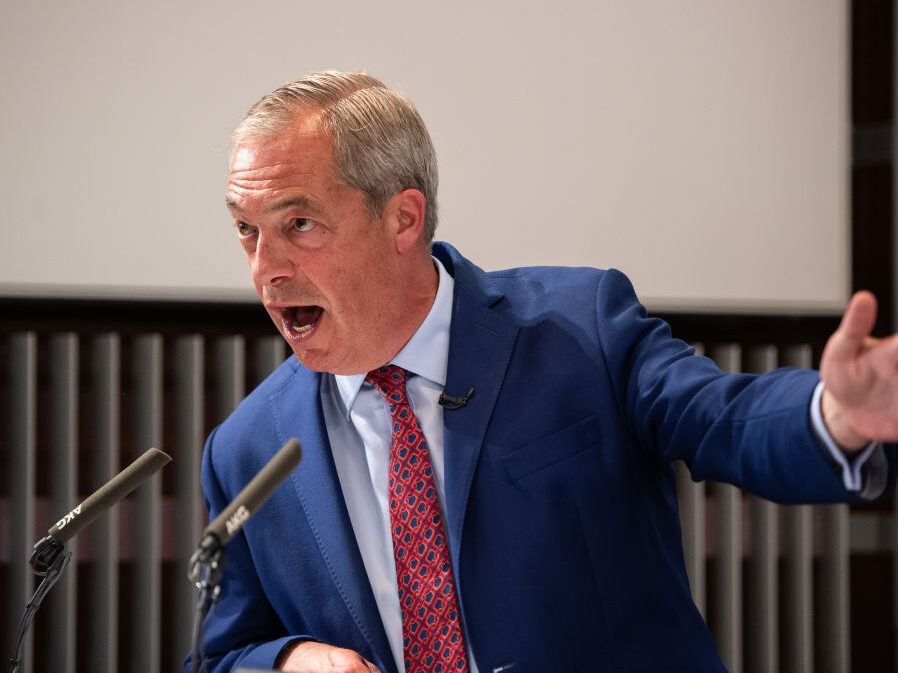Now Reform UK has a bridgehead in Parliament, it is time to start the next part of the plan — “professionalising” the party to get it ship-shape ready to challenge the coming elections in 2029.
It is time to start chasing the Labour vote, and turning Reform into an efficient machine for contesting elections, Nigel Farage said in a victory press conference with his fellow newly-elected Party candidates due to be sworn into Parliament next week. In an event attended by supporters and press in central London, Mr Farage was repeatedly interrupted by a string of protesters who revealed themselves, one after the other, as their predecessor was carried out of the room.
Up to half a dozen held up proceedings in this way before their numbers were exhausted, and all the while chided by Mr Farage himself who teased the activists, calling them drunk and overexcited, and liable to give themselves a medical condition by getting so worked up. Laughing away, he called to one: “don’t worry, there’s still plenty of beer in the pub mate. Have a lovely day, lots of love!… Boring! Boring! Boring!”.
In one comedy moment, Mr Farage rhetorically asked the room, believing all protesters to have left, “Any more for any more?”, before yet another stood up to reply: “Actually yes!”.
Excitement dispensed with, Mr Farage introduced his fellow electees Richard Tice for Boston and Skegness, Lee Anderson for Ashfield, and Rupert Lowe for Great Yarmouth. Shortly after the meeting, a fifth candidate won their count, James McMurdock of South Basildon.
Mr Farage said the election of the men showed he had achieved his two objectives for this election, called at such short notice by previous Prime Minister Rishi Sunak — out of a job this morning — which he recalled were “to get millions of votes. The second was to establish a bridgehead in Parliament”. Now, the task is to prepare to challenge to take over the government itself in 2029, he said.
Reflecting how just six weeks ago the Reform party really only existed on paper with no money, no infrastructure, and no staff, Mr Farage praised what it had managed to achieve in the short election campaign but said it had to shape up immediately. The fact it had adopted candidates without having had the time or resources to properly vet them — several of which went on to seriously embarrass the party, to Mr Farage’s undeniable anger — would never be permitted to happen again, he said.
Mr Farage told the room: “Those few bad apples that have crept in will be gone, and we will never have any of their type back in our organisation, you have my 100% promise on that.”
One thing that has been a constant undercurrent in Reform discussions seen by Breitbart London during the campaign is the importance of, after the election, starting to build a nationwide network of local groups to keep the momentum alive, and to build a grassroots campaign, what Nigel Farage called the “people’s army” in the UKIP days. These conversations frequently touch on next year’s English council elections, which Reform, clearly wants to strongly contest, to capture those seats that would give it a stable national presence and resilience. He said on Friday:
…above all what we are going to do from today is we are going to professionalise the party, we are going to democratise the party… we have a huge job. Literally, we don’t even have a branch structure around the country. We’ve got so much to do, all of us, over the course of the next few months. We’re going to focus on what we’re doing, we’re going to focus on going after the Labour vote. We’re going to focus on vetting candidates for the English County Council elections that come up next year, so we know what we’re all about.
I said this is going to be the first step on a very, very big journey. This was a five-year plan. It is a five-year plan. I believe with structure, funding, professionalism, we can be in a very, very serious position to contest the 2029 General Election… if you think of the resources we had just a few short weeks ago, the lack of big branch structure, very little money. What we’ve done in a space of a few weeks is nothing short of remarkable, and I promise you this is just the beginning of something very, very big indeed.
Mr Farage said a big part of the local teams that would have to be built are local councillors, and he praised those who had defected to his team in Clacton, saying they would be an indispensable part of his local operation as the new Member of Parliament for Clacton. He said he would be announcing further defections on Saturday.
In an early clear indication that Mr Farage was ready to build bridges in Parliament, he said he was willing to work with “anyone and everyone” to push for a change of the British electoral system to proportional representation. This is a clear hands-across-the-divide offer, given the party traditionally most interested in electoral reform is the Liberal Democrats, with whom it could be reliably said Mr Farage’s faction would have absolutely nothing else in common.
He said:
…the results show us some very interesting things. If we have Proportional Representation, we’d be looking at nearly 100 seats. But equally First Past the Post inverts the other way, where Labour get less votes than they got under Corbyn, and yet 200 more seats. It is very much my view that our First Past the Post electoral system is not fit for purpose and we will campaign for anyone and everyone to change this electoral system.
